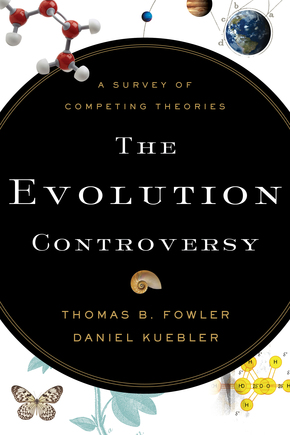The Evolution Controversy
 Thomas B. Fowler and Daniel Kuebler, The Evolution Controversy: A Survey of Competing Theories (Grand Rapids: Baker Academic, 2006), 382 pages.
Thomas B. Fowler and Daniel Kuebler, The Evolution Controversy: A Survey of Competing Theories (Grand Rapids: Baker Academic, 2006), 382 pages.
Fowler and Kuebler have offered us a gem by publishing this volume. Not since my undergraduate degree in the study of Biology have I encountered such an objective treatment of data from the biological world. Fowler and Kuebler offer the reader, trained academicians and laypeople alike, a balanced, in-depth, and critical study of the evolutionary controversy. Scientifically accurate and precise, yet readable by the masses, this volume is to be promoted for both those within the Science and Religion debate, as well as those outside of it within the general church. Fowler and Kuebler give a concise review of the history of the evolutionary argument, the evidence in favor of it, the evidence which is seemingly contradictory of it, as well as an in-depth coverage of the major points of dispute (e.g., common descent versus common design, the ability of random mutations to generate authentically new information, the sole adequacy of natural selection, the age of the earth/universe, and the requirements for a true scientific theory). Moreover, Fowler and Kuebler delineate the four major schools of thought regarding the evolutionary controversy: the Neo-Darwin advocates, the Intelligent Design proponents, the Creationists, and the promoters of the Meta-Darwinian interpretation. Fowler and Kuebler gave a quite lucid summary of the three general meanings of evolution, which the readers of Pneuma Review would be wise to understand and be able to distinguish: Historical Evolution (i.e., the observed sequence of development over the earth’s history, which is accepted fully by all four schools of thought, though the time parameters involved are different for the Creationist school of thought); Common Descent (i.e., the notion that all organism are somehow related to a common ancestor or a group of common ancestors, which is similarly though qualified accepted by all four schools of thought); and Strong Darwinian Evolution (i.e., the notion that purely natural mechanisms are fully able to explain all of the development of species upon earth, which is only accepted by the Neo-Darwinians and Meta-Darwinians). Fowler and Kuebler make explicit throughout their analyses of the four schools of thought several key distinctions, including the difference between facts and the explanation of facts, the difference between theory and fact, and the difference between criticisms of one theory and advocacy of an alternative theory (i.e., positive apologetics and negative apologetics). The authors thoroughly analyze the Neo-Darwinian paradigm, which seeks to explain evolution through the mechanisms of random mutation and natural selection alone, and conclude that this paradigm can adequately explain small-scale change (i.e., microevolution), but is deficient in explaining large-scale evolution (i.e., macroevolution). Fowler and Kuebler note that there is little direct evidence that the Neo-Darwinian paradigm can explain all evolutionary change. In covering the Creationist school of thought, the authors note that according to the Creationists, natural selection can only adapt populations to their environment, and that mutation, according to the Creationists, leads only to degenerative speciation. Fowler and Kuebler are explicit in noting the difficulties faced by the Creationist school of thought, particularly in trying to condense the history of the universe into roughly 10,000 years. However, they do not, contra many other treatments of Creationists in the available literature today, ridicule the Creationist viewpoint.
Category: In Depth, Summer 2017


